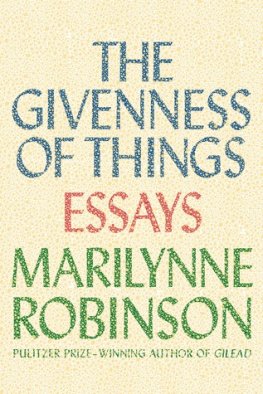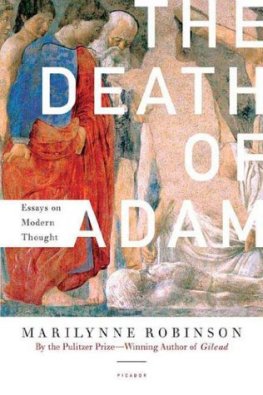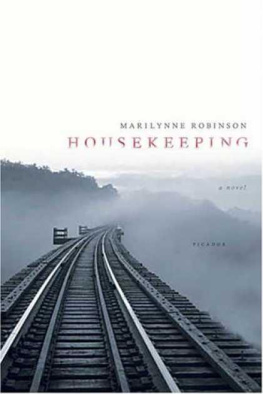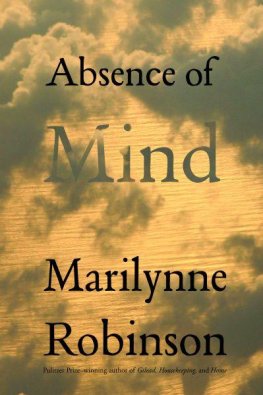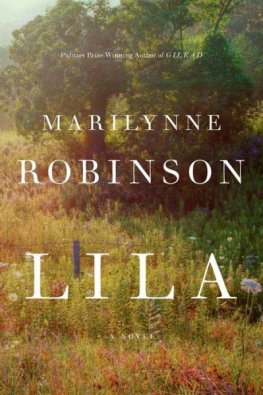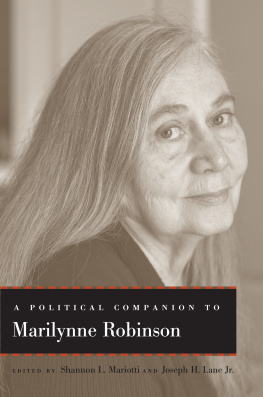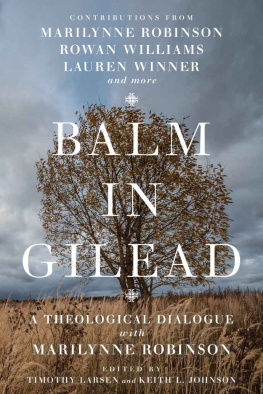Marilynne Robinson
The Givenness of Things
For Bob and Peg Boyers, with much love and many thanks
Humanism was the particular glory of the Renaissance. The recovery, translation, and dissemination of the literatures of antiquity created a new excitement, displaying so vividly the accomplishments and therefore the capacities of humankind, with consequences for civilization that are great beyond reckoning. The disciplines that came with this awakening, the mastery of classical languages, the reverent attention to pagan poets and philosophers, the study of ancient history, and the adaptation of ancient forms to modern purposes, all bore the mark of their origins yet served as the robust foundation of education and culture for centuries, until the fairly recent past. In muted, expanded, and adapted forms these Renaissance passions live on among us still in the study of the humanities, which, we are told, are now diminished and threatened. Their utility is in question, it seems, despite their having been at the center of learning throughout the period of the spectacular material and intellectual flourishing of Western civilization. Now we are less interested in equipping and refining thought, more interested in creating and mastering technologies that will yield measurable enhancements of material well-being for those who create and master them, at least. Now we are less interested in the exploration of the glorious mind, more engrossed in the drama of staying ahead of whatever it is we think is pursuing us. Or perhaps we are just bent on evading the specter entropy. In any case, the spirit of the times is one of joyless urgency, many of us preparing ourselves and our children to be means to inscrutable ends that are utterly not our own. In such an environment the humanities do seem to have little place. They are poor preparation for economic servitude. This spirit is not the consequence but the cause of our present state of affairs. We have as good grounds for exulting in human brilliance as any generation that has ever lived.
The antidote to our gloom is to be found in contemporary science. This may seem an improbable stance from which to defend the humanities, and I do not wish to undervalue contemporary art or literature or music or philosophy. But it is difficult to recognize the genius of a period until it has passed. Milton, Bach, Mozart all suffered long periods of eclipse, beginning before their lives had ended. Our politics may appear in the light of history to have been filled with triumphs of statecraft, unlikely as this seems to us now. Science, on the other hand, can assert credible achievements and insights, however tentative, in present time. The last century and the beginning of this one have without question transformed the understanding of Being itself. Understanding is not quite the right word, since this mysterious old category, Being, fundamental to all experience past, present, and to come, is by no means understood. However, the terms in which understanding may, at the moment, be attempted have changed radically, and this in itself is potent information. The phenomenon called quantum entanglement, relatively old as theory and thoroughly demonstrated as fact, raises fundamental questions about time and space, and therefore about causality.
Particles that are entangled, however distant from one another, undergo the same changes simultaneously. This fact challenges our most deeply embedded habits of thought. To try to imagine any event occurring outside the constraints of locality and sequence is difficult enough. Then there is the problem of conceiving of a universe in which the old rituals of cause and effect seem a gross inefficiency beside the elegance and sleight of hand that operate discreetly beyond the reach of all but the most rarefied scientific inference and observation. However pervasive and robust entanglement is or is not, it implies a cosmos that unfolds or emerges on principles that bear scant analogy to the universe of common sense. It is abetted in this by string theory, which adds seven unexpressed dimensions to our familiar four. And, of course, those four seem suddenly tenuous when the fundamental character of time and space is being called into question. Mathematics, ontology, and metaphysics have become one thing. Einsteins universe seems mechanistic in comparison, Newtons, the work of a tinkerer. If Galileo shocked the world by removing the sun from its place, so to speak, then this polyglot army of mathematicians and cosmologists who offer always new grounds for new conceptions of absolute reality should dazzle us all, freeing us at last from the circle of old Urizens compass. But we are not free.
There is no art or discipline for which the nature of reality is a matter of indifference, so one ontology or another is always being assumed if not articulated. Great questions may be as open now as they have been since Babylonians began watching the stars, but certain disciplines are still deeply invested in a model of reality that is as simple and narrow as ideological reductionism can make it. I could mention a dominant school of economics with its anthropology. But I will instead consider science of a kind. The study of brain and consciousness, mind and self associated with so-called neuroscience asserts a model of mental function as straightforward, causally speaking, as a game of billiards, and plumes itself on just this fact. It is by no means entangled with the sciences that address ontology. The most striking and consequential changes in the second of these, ontology, brings about no change at all in the first, neuroscience, either simultaneous or delayed. The gist of neuroscience is that the adverbs simply and merely can exorcise the mystifications that have always surrounded the operations of the mind/brain, exposing the machinery that in fact produces emotion, behavior, and all the rest. So while inquiries into the substance of reality reveal further subtleties, idioms of relation that are utterly new to our understanding, neuroscience tells us that the most complex object we know of, the human brain, can be explained sufficiently in terms of the activation of packets of neurons, which evolution has provided the organism in service to homeostasis. The amazing complexity of the individual cell is being pored over in other regions of science, while neuroscience persists in declaring the brain, this same complexity vastly compounded, an essentially simple thing. If this could be true, if this most intricate and vital object could be translated into an effective simplicity for which the living world seems to provide no analogy, this indeed would be one of natures wonders.
Neuroscience has, as its primary resource, technology that captures images of processes within the living brain. Fear lights up a certain area, therefore fear is a function of that area, which developed for the purposes of maintaining homeostasis. It prepares the organism to fight or flee. Well and good. But fear is rarely without context. People can be terrified of spiders, dentists, the Last Judgment, germs, the need to speak in public, thirteen, extraterrestrials, mathematics, hoodies, the discovery of a fraud in their past. All of these fears are the creatures of circumstance, of the history and state of health of a specific brain. They identify threat, interpreting an environment in highly individual terms. They, not threat in the abstract, trigger alarm, and they are the products of parts of the brain that do not light up under technological scrutiny and would elude interpretation if they did. If they are not taken into account, the mere evidence of an excitation has little descriptive and no predictive value. A fearful person might take a pill, faint, or commit mayhem. The assumptions behind the notion that the nature of fear and the impulses it triggers could be made legible or generalizable for the purposes of imaging would have to exclude complexity the factor that introduces individuality with all its attendant mysteries. In fairness, however, the neuroscientists seem well content with the technology they have, extrapolating boldly from the data it yields. Refinements that introduced complication might not be welcome.

